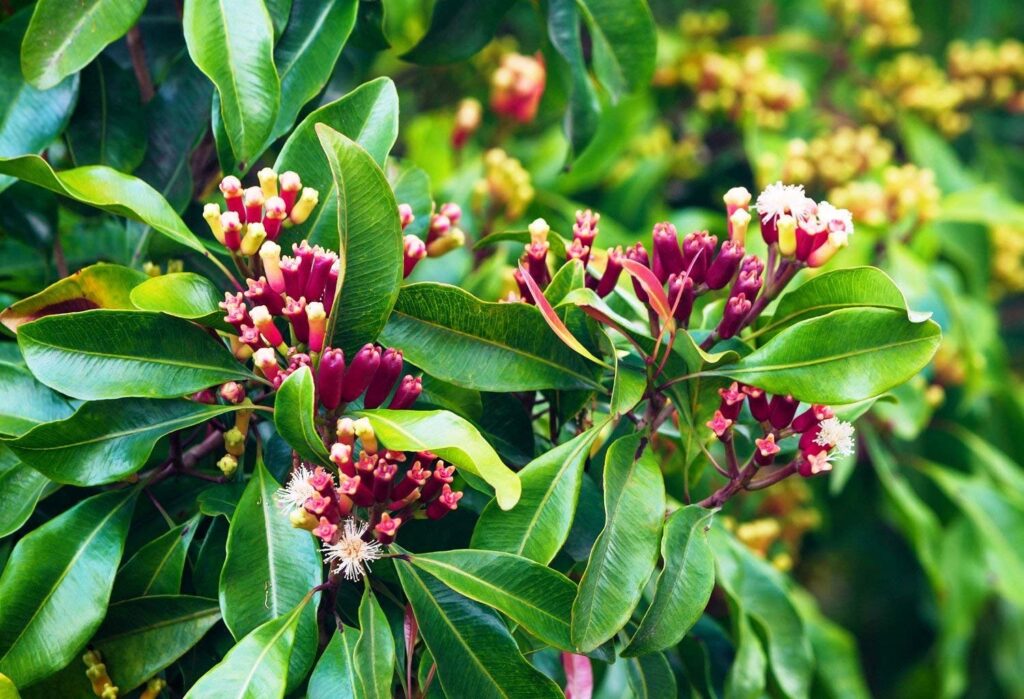Syzygium Aromaticum
Benefits of Lavang-
Digestive Dynamo: Cloves have a storied history as digestive aids. Their compounds stimulate enzyme production, promoting efficient digestion and alleviating discomfort like bloating and gas.
Anti-Inflammatory Emissaries: Cloves house potent anti-inflammatory properties. Their active compounds, including eugenol, can help quell inflammation, making them valuable allies in managing inflammatory conditions.
Dental Guardian: The antimicrobial and analgesic properties of cloves have earned them a spot in dental care. Clove oil has been traditionally used to alleviate toothaches and reduce oral bacteria.
Immune Booster: Rich in antioxidants, cloves bolster the immune system, providing a shield against oxidative stress and supporting overall health.
Blood Sugar Balancer: Some research indicates that cloves may help regulate blood sugar levels, making them potentially beneficial for individuals with diabetes. Benefits of lavang.

Lavang Medicinal Uses-
Traditional Elixirs: Cloves have long been used in traditional medicine for their analgesic and antibacterial properties. They are employed in infusions and poultices for pain relief and wound management.
Aromatic Comfort: Clove’s aroma has been employed in aromatherapy to ease stress and anxiety. Diffusing clove oil can create a soothing ambiance.
Respiratory Revival: Cloves have been included in formulations to address respiratory issues like congestion and cough. Their natural expectorant qualities can provide relief.
Skin Soothing: The antiseptic and anti-inflammatory nature of cloves makes them useful for addressing skin conditions like acne and minor irritations.
Digestive Delights: Cloves find their way into herbal teas and tonics, aiding digestion and offering a comforting sip after a meal. Lavang medicinal Uses. Darumukti
How to Use Cloves for Pain Relief-
Clove Oil Massage: Dilute a few drops of clove essential oil with a carrier oil, such as coconut or jojoba oil. Gently massage the blend onto the affected area. The warming properties of cloves can help ease muscle tension and alleviate pain.
Compress Companionship: Infuse warmth into your pain-relief journey. Add a few drops of clove oil to a bowl of warm water. Soak a clean cloth in the infused water, wring it out, and place it on the painful area. The combination of heat and clove’s natural analgesic qualities can offer soothing relief. How to use cloves for Pain Relief. Lavang medicinal uses.
Clove-Infused Salves: Craft your own pain-relieving salve. Mix clove-infused oil (made by steeping crushed cloves in a carrier oil) with beeswax. Apply the salve topically to areas of discomfort. This blend creates a protective barrier while delivering clove’s benefits directly to the source of pain.
Aromatic Baths: Indulge in the luxury of an aromatic bath. Add a few drops of clove essential oil to your bathwater. As you soak, the steam carries the soothing scent of cloves, helping to ease muscle soreness and promote relaxation.
Clove-Infused Hot Packs: Prepare a simple hot pack for targeted relief. Fill a clean sock with rice and tie the end. Heat the sock in the microwave for a short duration. Add a drop or two of clove essential oil to the warm sock and apply it to the achy area. The combination of heat and cloves creates a comforting experience. Darumukti

How to use Clove for Cough-
Clove-Infused Honey: Create a natural cough syrup by blending crushed cloves with raw honey. Consume a teaspoon of this mixture to soothe throat irritation and help suppress coughing. The antimicrobial properties of cloves can also contribute to a healthier respiratory tract.
Clove Tea Tonic: Brew a cup of clove tea to ease cough symptoms. Steep a few whole cloves in hot water for about 10 minutes. For added benefits, consider adding ginger and a touch of honey to the tea. Sip this aromatic blend to alleviate throat discomfort and promote respiratory comfort.
Steamy Clove Inhalation: Fill a bowl with hot water and add a drop or two of clove essential oil. Create a tent over your head with a towel and position your face over the bowl, inhaling deeply. The steam infused with clove’s natural expectorant properties can help relieve congestion and quiet coughs.
Clove-Infused Lozenges: Individuals can create their own soothing cough lozenges by combining clove-infused oil with natural sweeteners like honey or maple syrup. The mixture should then be shaped into small, solidified lozenges. Pop one into your mouth whenever your cough needs soothing relief. Navchetana
Aromatic Diffusion: Fill your living space with the soothing scent of clove by using an essential oil diffuser. Diffusing clove essential oil can help create an environment that supports respiratory health and soothes cough symptoms. How to use clove for Cough. Darumukti
Side Effects of Lavang-
While cloves hold a bouquet of benefits, it’s vital to tread cautiously and be aware of potential side effects. Here are five crucial points to consider before incorporating cloves into your wellness regimen:
Skin Sensitive:– Skin sensitivities can occur when directly exposed to clove oil, resulting in redness or irritation. To minimize the risk of adverse reactions, it is advisable to conduct a patch test prior to applying clove oil topically and dilute it with a carrier oil. This helps ensure safety and reduce the chances of any unwanted skin responses.
Digestive Disturbance :- Digestive disturbances can occur when consuming an excessive amount of cloves, particularly in concentrated forms. These unpleasant effects include nausea, vomiting, and diarrhea. To prevent such discomfort, it is essential to practice moderation while consuming cloves. Side Effects of Lavang.
Blood Thinning Effect: Cloves contain compounds that may have anticoagulant properties. If you’re on blood-thinning medications or have bleeding disorders, consult a healthcare professional before using clove supplements or oils, as they could interact and exacerbate bleeding risks.
Allergic Reactions: Allergic reactions to cloves, albeit rare, can occur. If an individual experiences symptoms such as itching, swelling, hives, or difficulty breathing after consuming or using cloves, it is crucial to discontinue their use immediately and seek prompt medical attention.
Pregnancy and Breastfeeding Caution: It is advisable for pregnant and breastfeeding individuals to exercise caution while using cloves. High doses of clove oil or clove supplements are not recommended during this time, as they may impact hormone levels and have potential effects on the fetus or infant. Side Effects of Lavang.
it is Also use in Alcohol de- addiction medicine:Alcohol
CONCLUSION-
In the realm of natural remedies, cloves shine as aromatic gems, offering an array of benefits from pain relief to cough management. Their rich history, rooted in traditional practices, intertwines seamlessly with modern wellness approaches. Whether used in massages for muscle comfort, as teas to ease coughs, or as aromatic inhalations for respiratory relief, cloves offer a fragrant journey towards well-being.
Yet, as with any remedy, caution is key. Individual sensitivities, potential interactions, and proper dilution should be considered. Cloves ability to provide comfort is a testament to nature’s bounty, and their versatile applications reflect their resilience through time.
As you explore the world of cloves, remember that balance and awareness are paramount. Their aromatic allure has been valued for generations, and their potential to alleviate discomfort is a gift to be cherished. Cloves invite us to discover the soothing power of nature, encapsulated in their fragrant embrace. Side Effects of Lavang. How to use clove for Cough.
The “Navchetana” product contains Clove as its ingredient that helps in relieving an alcoholic from various ailments such as bad liver functioning, bad breath, poor digestion, loss of immunity, headache, weight gain and diabetes. Darumukti

